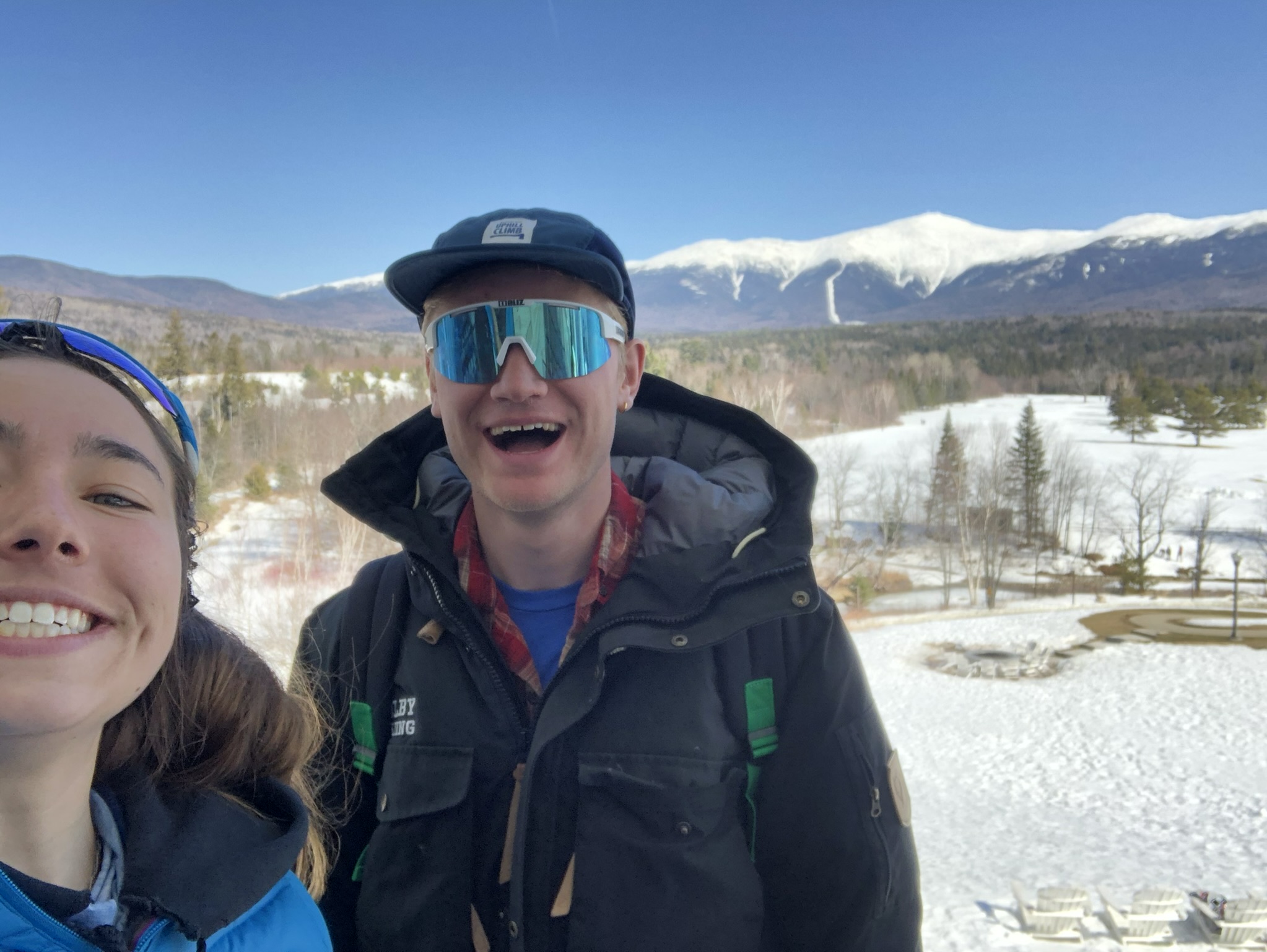
All friendships have a mythology, and all mythologies have their origin story. For Annika Martell and me, that origin story takes place in a marsh outside of West Bend, Wisconsin.
Anni and I did not meet until college—we were both part of the incoming class of 2020 at Colby College that arrived on campus in Waterville, Maine in August 2016, but my mother and her father were both raised in this same heart of heartlands north of Milwaukee. At our first practice as members of the Colby College Nordic Ski Team, Anni pulled out a set of rollerskis from a ski box. Seeing that she had stuck a Green Bay Packers sticker on both rear fenders, I exclaimed, “Go Pack Go.” The smile she returned let me know that in those nerve-racked early days in the world of high-brow liberal arts education, I had found an allie in my uncut Midwestern goofiness. Through those early uneven steps out into the world, Anni was there as a steady presence to celebrate who I was in my most unfashionable, and true, self—a kid who had seen very little of the world beyond Eau Claire, Wisconsin, was all in on loving his God, his family, and the Green Bay Packers, and for whom the American Birkebeiner may as well have been the center of the universe.
Which brings us back to the marsh outside of West Bend. After a few months of knowing each other, Anni asked me if she could tell me a weird story, and what flowed out from it was an instant recognition of a shared memory in myself. Shared grins followed, and we traveled back to that place that Wisconsin occupies in both our minds: pure nostalgia, memories of family, a place for all the good feelings of the past. There in a marsh was a little blonde-haired boy. He’d gone for Friday fish fry with his family—very Wisconsin sentence—gotten a stray quarter and put it in one of those toy machines where once you turn the knob far enough, it clicks, and a cheap trinket comes out in a plastic capsule. He had gotten a ring, and then promptly dropped it on the family walk around the marsh afterward. A little black-haired girl had come to the rescue, helped find that little toy ring, and then they went their separate ways until they met in Maine all grown up. The moral of the fable: Even before I knew that I knew her, Anni Martell had helped me find my diamond in the rough.
These days she is still helping me be that diamond in the rough and doing the same for an ever-growing number of athletes she has worked with in her young career as a ski coach. Most days, that includes the Williams College Nordic Ski Team, but this season it has also meant the US Ski Team, as she traveled to intern with the coaching staff through Beitostolen and Davos as one of the National Nordic Foundation’s Trail to Gold Fellows.
When she returned, I heard tales from my friend of taking those exciting first steps onto the top level of our sport. I was all ears; I was inspired. What follows details the experiences and reflections of one of this year’s Trail to Gold Fellows, and captures the early journey through the profession for a talented coach within the US ski community from the perspective of her FasterSkier reporting friend.
ADVERTISEMENT
The Trail to Gold Fellowship Comes Together
“I think some of the key moments in my coaching journey have happened when mentors, coaches, colleagues or friends around me didn’t expect that they were making a real impact,” said Anni when I caught up to her after her stint on the World Cup. That might be a sentiment familiar to many coaches out there—that proud moment when an athlete reflects on a tip or cue that stuck with them without your knowing—but it isn’t one that many coaches find themselves reflecting on about themselves. In the case of the Trail to Gold Fellowship—launched last summer in a partnership between the Olympic Women’s Book Project, Women Ski Coach’s Association, and National Nordic Foundation—bringing an experience to talented women coaches that would have an unsuspecting impact was the essence of the program’s impetus. The Fellowship is sending talented Women coaches to the World Cup this season, but its existence has come as the result of a cumulative impact of skiers and the ski community over a long period of the sport’s history.
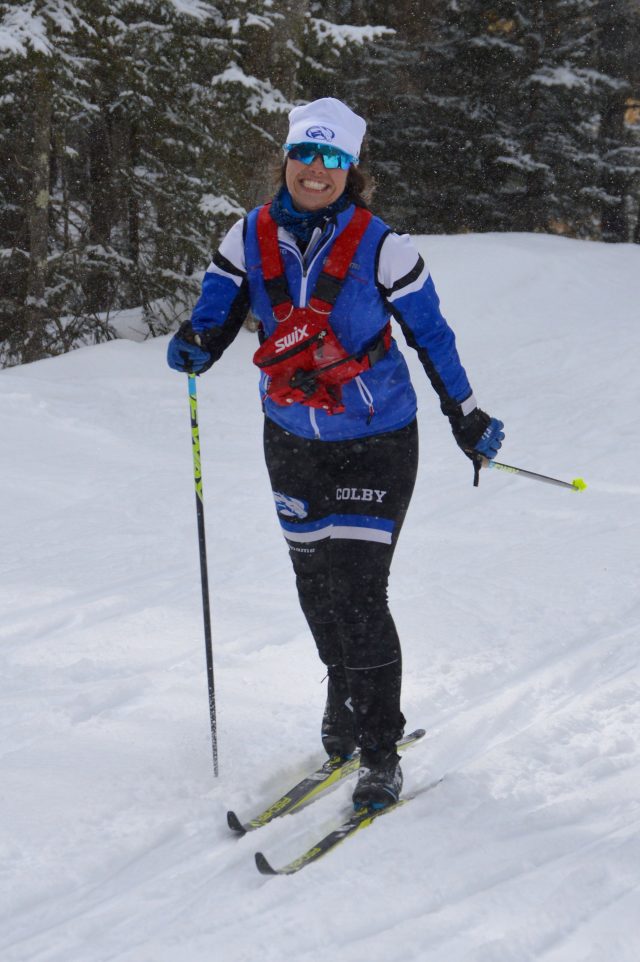
That connection to such a length of time comes via the 2021 publication of Trail to Gold: The Journey of 53 Women Skiers, which recounts the story of each woman to have represented the United States in cross-country skiing at the Olympics from 1973 to 2018. As Ella Hall recounted in her book review at the time of publication, the impetus of that book resulted from an exercise by the women’s contingent of the US Ski Team in 2013-14 where members interviewed team members from the history of Women’s skiing in the United States. It proved true to the principles of skiing—accentuated all that was good about the individuals involved—and soon organization, camaraderie, and a drive started to formally connect the larger community of skiers past and present. The U.S. Nordic Olympic Women’s group (USNOW) was formed in 2018 out of a meeting of Kikkan Randall and Alison Owen-Bradley to provide continued support for competitive Women’s skiing in the United States, with a book committee (headed by Sue Long Wemyss) resulting in the publication of Trail to Gold.
As Trail to Gold was hitting shelves across the country in December 2021, the model for what it might next inspire was being set by Kristen Bourne—then-St. Scholastica Assistant Coach—who was completing an internship on the World Cup with the US Ski Team staff supported by a Tara VanDerveer Award from the NCAA to support Women’s coach development in collegiate sports. The two-week stint proved impactful for both Bourne, who saw the experience gained lead to a position with the US Ski Team D-Team.

Last summer, the committee that Wemyss had fronted connected with the Women’s Ski Coaches Association (WSCA) with the idea of continuing the type of internship that Bourne had completed with the US Ski Team with the proceeds from the sale of Trail to Gold. US Ski Team Head Coach Matt Whitcomb brought the idea to the National Nordic Foundation, where he serves as a Board Member. NNF joined to provide additional funding, and the Trail to Gold Fellowship became a reality. The inaugural class was announced in November.
The Trail to Gold for Annika Martell
There are the friends you work with, and the friends you escape work with. Then there are the rare ones with whom you can do both. Initially, skiing was the latter for Anni and myself: our escape. Then, over the space of the last two years, skiing became the former: our professions. As a consequence, when we catch up these days, it is usually registers as some kind of impromptu ski coaching conference. A phone call that begins with “I just saw your old roommate last weekend” can quickly morph into a conversation about the virtues of running Start Oslo versus a Klister-Hard wax cover. Implicit in that is a fluidity that features as a strength of the US ski community: athletes can play coach; coaches can sometimes play athletes; and to truly understand athlete development, coaches can work on multiple different registers of development all at the same time.
Anni has found that current and ridden it well. Originally from Minnesota, she engaged in that understated but important practice in America’s most robust high school league where athletes regularly get involved in teaching learn-to-ski with the Minnesota Youth Ski League. That followed her when she was my teammate at Colby, where our team made a regular practice of helping with the Bill Koch club at Quarry Road in Waterville, Maine. From there, for Anni, it was a more formal step into coaching. As our final season racing on the collegiate circuit wrapped up in the spring of 2020, she had secured an internship with the US Biathlon Association to work with their athletes in Lake Placid that summer, and with it, her coaching journey had begun in earnest. Then there was a season at Ford Sayre in Hanover, New Hampshire working with their Junior program, before moving into her current position as Assistant Coach at Williams College.
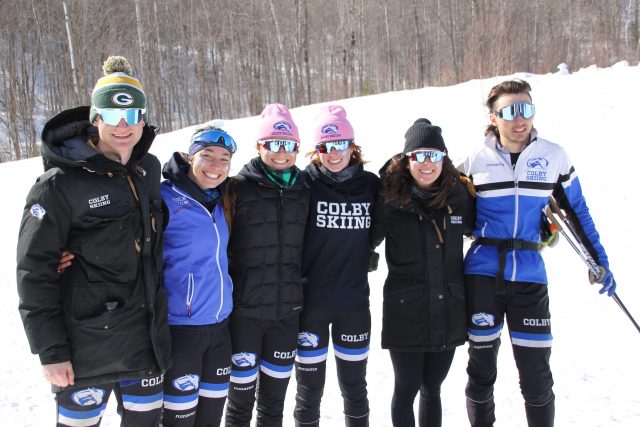
That quick journey was motivated by “some amazing coaches and role models I looked up to in the coaching profession, from the Bill Koch League all the way up to the national team,” says Anni. There is an approach couched within that statement, a seriousness to viewing coaching as a craft in which one should grow and develop. More uniquely, with Anni, is an ability to view her development as a coach with super seriousness, while projecting to her athletes the joy and fun that taking the sport of ski racing seriously can be.
In her willingness to see coaching as a craft—one that takes a long journey to master—Anni has identified something that US Skiing is still busy learning on a national scale. Coaching development requires as serious a commitment as athlete development.
ADVERTISEMENT
Trail to Gold: On the World Cup
That coach development is a growing priority for US skiing is fundamental to the Trail to Gold Fellowship’s mission. On the organizers end, the T2G Fellowship represents a commitment to providing promising Women coaches with the experience and credentials required to correct a historic inequity on the highest level of coaching within the United States development system. For an individual coach like Anni, it represented “a great opportunity to learn. There’s so much to learn from people we come into contact with: techs, coaches, and, of course, athletes!” Anni joined Naomi Kiekintveld (APU/Anchorage South), Liz Stephen (Park City), Caitlin Gregg (Team Birkie), and Lizzie Larkins (Montana State) in the inaugural class of T2G Fellows when they were announced by the NNF in November.
Anni’s two-week stint on the World Cup included the back end of Period I (December 9-December 18), a weekend in Beitostolen, Norway followed by a mad dash to the Alps in Davos, Switzerland. That was a big opportunity, but it was also one Anni says she considered carefully: the Fellowship meant two weeks away from the Williams Ski Team during a crucial block leading into the Eastern Carnival Circuit. “I talked with [Williams Head Coach Steve Monsulick], and we decided that it was a great opportunity, and also would benefit our program through the lessons learned [on the World Cup too].”
On the actual “role” she played within the US Ski Team staff, Anni said that “it was really twofold: one part coach, one part wax technician.” Anni further divided the World Cup coaching experience into two types of days: “training, and race-days, which are all hands on deck.”
In Period I, the US Ski Team coaching staff included Head Coach Matt Whitcomb, Program Director Chris Grover, and D-Team Coach Kristen Bourne. On training days, Anni said that the “coaching” aspect of the staff’s job was on display in a way that goes unconsidered by most. “The athletes and coaches really are committed to improvement the whole time. On training days, coaches organize athlete training sessions, shoot video, offer technique advice, provide training and recovery council, discuss tactics – on top of all the other logistics involved with the World Cup—which requires some kind of superpower it seems.” Anni also added that her days were particularly busy on training days, as she cycled between coaching and learning the ropes as a wax tech.“[There was] a lot of testing: [wax], structure, ski selection,” she said.
On race days, the big takeaway was that even, and especially, on the World Cup, it’s “all hands on deck.” Changes to FIS policy this summer mean that for each team to gain their full allotment of Coaches’ bibs (required for course access), two of those bibs must go to Women coaches. For the US, having a Trail to Gold Fellow at all World Cup races this season means being able to use the full allotment of bibs. For Anni, this meant that she spent most race day mornings as a Fellow testing wax out on course alongside Kristen Bourne and the US Ski Team athletes.
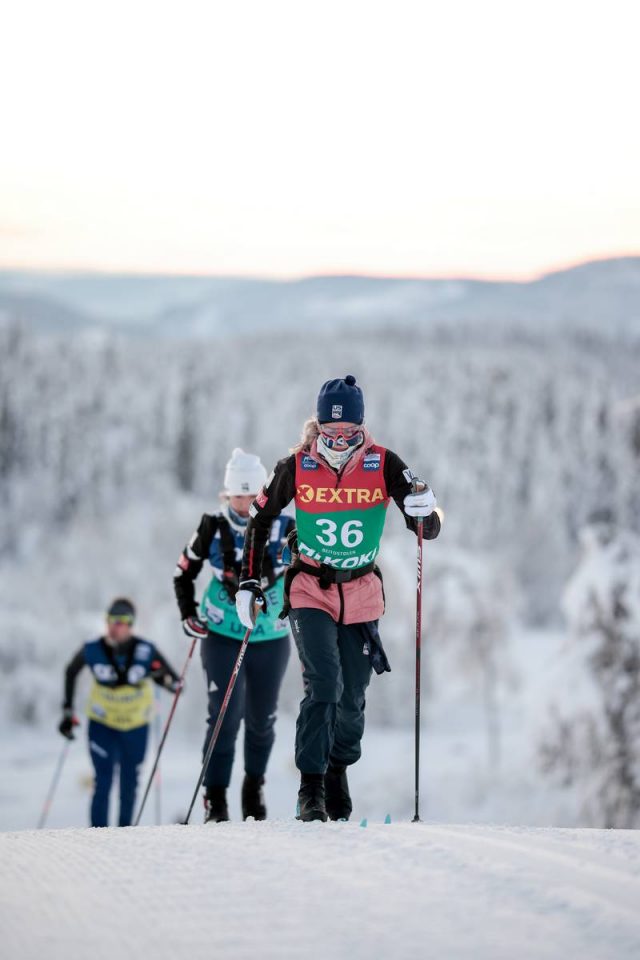
The two week period that coincided with Anni’s Fellowship found the US Team at the end of the intense three-week opening period of the World Cup this year which saw three, consecutive three-race weekends in Ruka, Lillehammer, and Beitostolen. By Beitostolen, fatigue and sickness had found their way into the camp. Some skiers would miss starts; others would look to manage their fatigue within the bigger picture of their goals for the season. Still, the US saw skiers turn in top 10 finishes in both the weekend’s classic sprint, and 10 k classic. Sunday’s Team Relay would pose a unique challenge to the US team, though. For most athletes, a decision had to be made: push through for the pride of the team—a foundational principle that the US has held to in building success over the past decade—or rest and push for results in Davos.
In the end, the US ended up not starting either Jessie Diggins or Rosie Brennan—two parts of the Team Relay that won in Falun in 2021—and scratched one of their two teams for the Beitostolen 4 x 5 k Relay. Head Coach Matt Whitcomb said he “[felt] weird to say I support [the decision to rest] as a coach,” describing it as “emotionally tough.” But it was a decision with a clear forward-looking motive. At Davos, the US team felt there was “a good chance to end Period I on a high note.”
When Davos came, the US started the weekend off strong—2nd place in the skate sprint for Jessie Diggins—and then ended on nothing less than a definitive highlight in program history: Jessie Diggins first and Rosie Brennan third in the 20 k skate. For Anni, it felt like a “culminating moment” for the whole T2G Fellowship experience. “One of the biggest things I’ll take away from [those two weeks] is that our athletes are SO resilient,” she said. “The mental toughness it takes to be resilient when results don’t go your way, and know when to take care of yourself was fully on display in that tough decision to hold off and bounce back. And [Jessie and Rosie] just skied their hearts out [in that Davos race], it was amazing to watch it unfold. ” Through two weeks, a whole odyssey had played out for the US team—trial, tough decisions, will, determination and all—and had resolved into an extraordinary ending. The diamond had been pulled from the rough.
And with that, Anni had helped do for the US Ski Team what she had done for me as a friend. Of what she is taking back to the US, she says that it is a mix of small and big things. On the smaller end, she says that “the wax technician experience is invaluable on the [World Cup]. There’s just no good way to mimic that, and I’m leaving with techniques and hacks that I’ll use in the wax solving problem going forward.” On the grander scale, though, there is the experience that speaks to who Anni is as a person, and the community that has fed into accentuating her proudest qualities. “There’s such a rising tide lifting up women in US skiing and ski coaching,” she said. “And I think the continuation of that is so important on the World Cup and elsewhere in US Skiing. I think I’m more conscious of the messages I send when offering trust and placing values on other others’ experiences.”
The weekend after the eastern Carnival season had ended in March 2020, Anni Martell and I took a trip. We were both seniors, and both headed to NENSA’s U16 Festival in Chittenden, Vermont to coach, before meeting up with a bunch of Colby teammates to race the Bretton Woods Marathon in New Hampshire. Coaching, racing, all in one go: we had entered that liminal space of post-ski racing life, but we were still skiing, for sure. The world was also in a liminal space, whether it knew it or not. A week later, the COVID pandemic would begin in earnest, Colby College would shut its doors, and we’d retreat back to where we came from—leeward towards our childhood bedrooms in the Midwest.
New England had just let up from its latest Nor’Easter, the freeze-thaw cycle had just begun in earnest, and through the backroads from Maine to Vermont there was nothing but spring, sunshine, and brightness ahead. As we traveled we talked and talked: about the friends we’d made through skiing and now loved outright, about what after four years of racing in New England had stuck with us. We speculated on where our friends would be going after graduation, and where we’d end up. It was a peaceful coda to a chapter in both our lives that was about to end in a big rush and panic.
There was a kind of finalized idealism that permeated the whole thing—the sureness you have right at the end of your youth about the world, before you learn that it’s way bigger than you ever imagined. We couldn’t help but look forward, sure only that we wanted to find a place to give every aspect of what we had to the world. Two years on from that moment, we met up at Theodore Wirth Park in Minneapolis, and I heard tales from a friend who spoke about how the last two weeks coaching on the World Cup had taught her that “[coaching] is about trying new things, being curious, investigative, analytical, but also rational and methodical, it’s everything—ALL aspects.” It seemed we had found that place we were looking for: skiing, and all that our journey in the sport—and in the community it creates—amplifies about ourselves, and our friends.
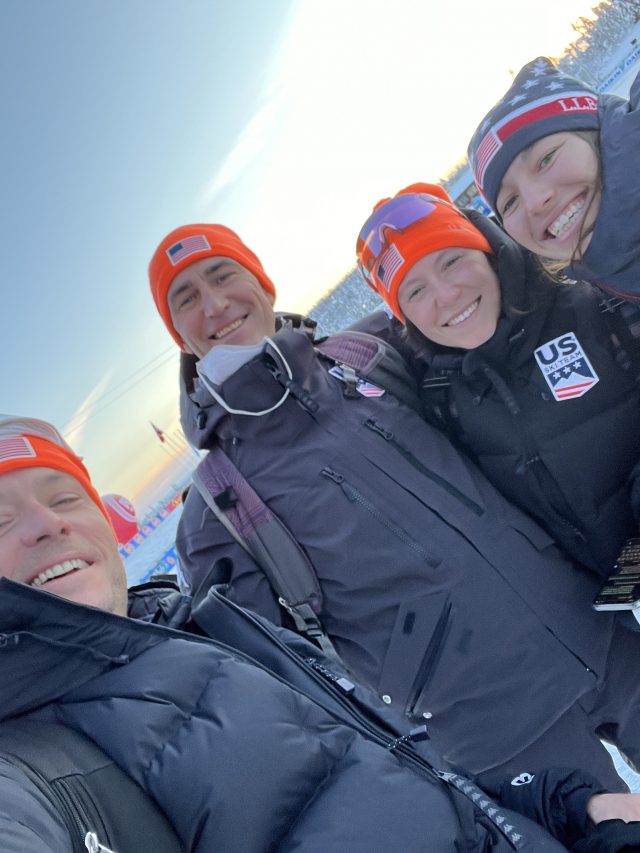
Ben Theyerl
Ben Theyerl was born into a family now three-generations into nordic ski racing in the US. He grew up skiing for Chippewa Valley Nordic in his native Eau Claire, Wisconsin, before spending four years racing for Colby College in Maine. He currently mixes writing and skiing while based out of Crested Butte, CO, where he coaches the best group of high schoolers one could hope to find.



